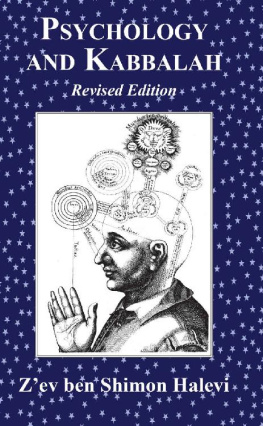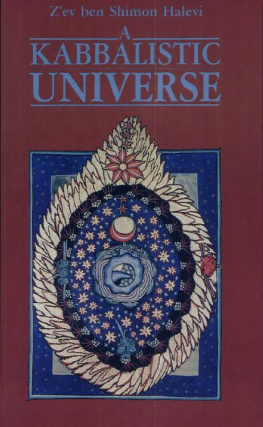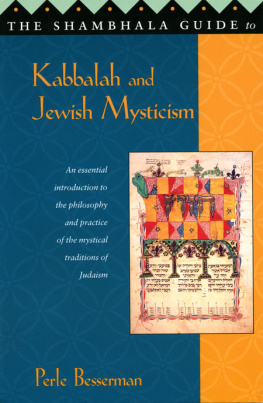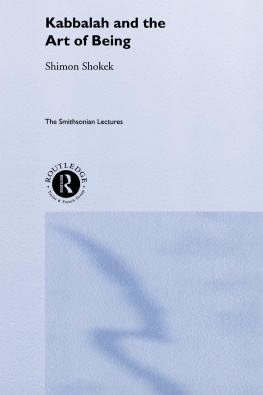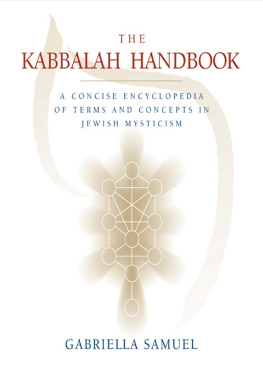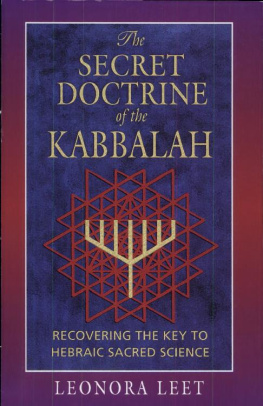PublicationInformation

Bet El Trust
Registered Charity No. 288712
www.kabbalahsociety.org
First published in 1986 by Gateway Books
Revised Edition in 2009 by Kabbalah Society
Kindle Edition in 2017 by Kabbalah Society
Copyright Zev ben Shimon Halevi 1986, 2009
Every effort has been made to obtain permission to reproduce copyright material but there may be cases where we have been unable to trace the copyright holder. The publisher will be happy to correct any omissions in future printings.
The moral right of the author has been asserted.
All rights reserved.
No part of this publication may be reproduced, stored in a retrieval system or transmitted, in any form or by any means, without the prior permission in writing of the publisher, nor be circulated in any form of binding or cover other than that in which it is published and without a similar condition including this condition being imposed on the subsequent purchaser.
A CIP catalogue record for this book is available from the British Library.
ISBN: 978-1-909171-23-7
Kindle Format by Affinity Systems, Inc.
www.AffinitySystems.com
For Rebekah
By the sameauthor:
Adam and the Kabbalistic Trees
A Kabbalistic Universe
The Way of Kabbalah
Introduction to The World of Kabbalah
The Kabbalist at Work
Kabbalah and Exodus
Kabbalah: School of the Soul
The Kabbalistic Tree of Life
Kabbalah & Astrology
The Anointeda Kabbalistic Novel
Anatomy of Fate
Path of a Kabbalist
A Kabbalistic View of History
By OtherPublishers:
KabbalahThe Divine Plan (HarperCollins)
Kabbalah, Tradition of Hidden Knowledge (Thames & Hudson)
Astrology The Celestial Mirror (Thames & Hudson)
As Above So Below (Stuart & Watkins)
Contents
List of Figures
So shall the knowledge of wisdom
be unto thy soul:
When thou hast found it,
then there shall be a reward.
Prov. 24:14
Figure 1INNER LEVELS
Here the interior dimensions of a human being are shown related to the psyche, spirit and Divine aspects of a person. Robert Fludd, a Rosicrucian, did not get the annotation quite right but he got the four Worlds of the Kabbalah correct with the Tree of Life configuration at the top. The period of this picture was when the West was shifting from religion and philosophy to the occult and science. (17th century woodcut).
Preface
When Adam and Eve came down from Eden there began a process of incarnation and comprehension into why they had been brought into being. This situation recurs each time we are born, as we learn about physicality and how it differs from that other reality whence we came. Most soon forget this prenatal memory but some seek to return to that state of soul by looking within. Psychology is the study of this archetypal World that hovers between Earth and Heaven; and Kabbalah is a spiritual tradition that places the psyches inner and outer counterparts in the context of the greatest reality. Combined, these bodies of ancient and modern knowledge can bring into focus the nature and purpose of our descent into matter, as the Self of each individual passes through level after level to become one with the Divine SELF who gazes through our eyes upon its own reflection.
London, Summer 5745
Figure 2GENERAL SCHEME OF THE PSYCHE
Here, kabbalistic psychology draws upon ancient, medieval and modern terms to fill in the structure and dynamic of the Tree of Life, as this diagram is called. This will be the basic reference system of the book, always remembering that this Tree is but a part of a Ladder of Trees of all Existence. The Hebrew names are keys to the principles of the ten-plus-one sefirot (or numbers) while the twenty-two paths reveal the functions of the triads. The thesis is that a human being is a microcosm of the macrocosm of a Universe based upon a Divine plan. (Halevi).
Introduction
Psychology is the science of the mind. The Greek root word psyche means soul or that which is not of the body but is the invisible component of a person. In prehistoric times, death was recognised as the moment of division between the body and what animated it. All over the world, people acknowledge this phenomenon and, indeed, take enormous pains to placate or honour the departed intelligence. Anyone who has seen the corpse of someone well known to them experiences the same sense of total absence, not only of life but of that peculiar essence which made the person unique. This recognition of an unseen yet palpable dimension of a human being must have generated the first enquiries into what it was that came into being at birth, possessed a certain character during life and disappeared at death. Here began psychology.
In the earliest stages of humanitys life on Earth, the main preoccupation was to learn to survive. People had to adapt to the interplay of the four elements, to use plants and relate to animals. Now, while these first human beings may have been primitive, their consciousness was of a quite different order from anything they might have encountered in the wilderness. Not only did they observe the ways of nature as the seasons turned but they recorded and collated experience in a manner that no other species could. Animals might respond to a drought by migrating or sleep through the winter to avoid its difficulties; but this was an inbred instinct completely unconscious at the individual level. Human beings saw the rhythms of the Earth as recurring patterns, then as principles from which they built up a picture of the Universe in which they lived. The most intelligent and sensitive of these early shamans formulated their conclusions into myths that explained the processes in the world about them. These speculations included the origin of the human race, whence it came and whither it was going. It is known that not a few had an experience of revelation in which they were shown the situation of mankind from a higher dimension. One such person was Enoch (Genesis V). He, according to kabbalistic legend, is said to be the source of various esoteric traditions that pass on these mystical illuminations.
By the time the first civilisation arose in Egypt and Mesopotamia, complete cosmologies had come into being about the World that lay behind the mundane events of daily life. The periodic upheavals of war, earthquake or famine were accepted as moods of the gods and goddesses who inhabited the invisible realm from which people came at birth and returned to at death. Great priests and kings, by sacrifice and deed, might influence events but, ultimately, the upper Worlds ruled the lower because no one, except perhaps the mystics and magicians, understood the laws of those unseen levels.
Now while birth and death were the dramatic entry and exit points of the unknown region, and therefore of great interest to everyone, there were some who were particularly interested in what went on between. Most people, it was noted, just existed, oblivious of any purpose but to survive; others were more outgoing and dominating while still others retired or sought to live an interior life, either in madness or deliberate contact with the invisible realms. These observations led to speculation about types of people, temperaments and fate which is the distinct pattern of a life as a persons particular nature interacts with the conditions into which they were born.

